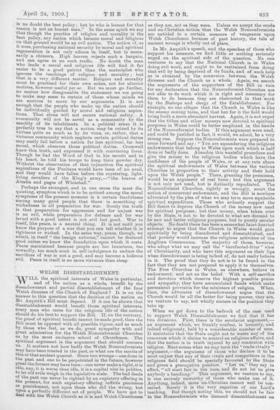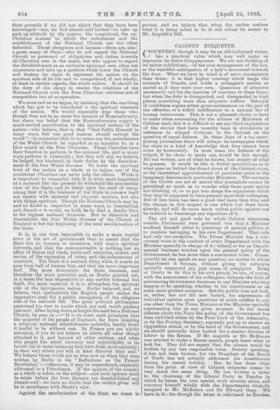WELSH DISESTABLISHMENT.
WILL the spiritual interests of Wales in particular, and of the nation as a whole, benefit by the disendowment and partial disestablishment of the four Welsh dioceses of the Church of England ? It is on the answer to this question that the decision of the nation on Mr. Asquith's Bill must depend. If it can be shown that disestablishinent would benefit those spiritual interests, every man who cares for the religious life of the nation should do his best to support the Bill. If, on the contrary, the proof of spiritual benefit cannot be made good, then the Bill must be opposed with all possible vigour, and as much by those who feel, as we do, great sympathy with and great admiration for the Welsh Nonconformist Churches as by the most exclusive school of Churchmen. The Spiritual argument is the argument that should concern us. It matters not how badly the Welsh Nonconformists may have been treated in the past, or what are the merits of this or that ancient quarrel. Since two wrongs—one done in the past and one to be perpetrated in the future, however great the former may have been—can never make a right, it is idle, nay, it is worse than idle, it is a capital vice in politics, to let old evils weigh in the legislative scale. The bad deeds of the past can never be righted by an expiatory offering in the present, for such expiatory offering inflicts penitence or punishment, not upon those who did the wrong, but Upon a perfectly different set of people. We have got to deal with the Welsh Church as it is and Welsh Churchmen as they are, not as they were. Unless we accept the crude and un-Christian notion *that the Welsh Nonconformists are entitled to a certain measure of vengeance upon Welsh Churchmen because of past history, the tale of ancient wrongs is wholly out of place.
In Mr. Asquith's speech, and the speeches of those who support his measure, we find little or nothing seriously urged on the spiritual side of the question. No one ventures to say that the National Church is in Wales doing evil work, and ought to be restrained from doing that evil by being deprived of its funds, and of such help as is obtained by the connexion between the Welsh dioceses and. the Church as a whole. Again, we search the arguments of the supporters of the Bill in vain for any declaration that the Nonconformist Churches are not able to do work which it is right and necessary for them to do because they. are obstructed in that work by the Bishops and clergy of the Establishment. For example, no one alleges that the Church in Wales is like the enemy sowing tares, and Oat but for it the field would bring forth a more abundant harvest. Again, it is not urged that the tithes and other moneys now devoted to spiritual purposes in Wales could be better employed in the hands of the Nonconformist bodies. If this argument were used, and could be justified in fact, it would, we admit, be a very strong one. Suppose the Nonconformists were prepared to come forward and say : "You are squandering the religious endowments that belong to Wales upon work which is half done or badly done. Abandon this wasteful procedure and give the money. to the religious bodies which have the confidence of the people of Wales, or at any rate share the spiritual endowments of Wales between the various Churches in proportion to their activity and their hold upon the 'Welsh people." There, granting the premisses, would be an argument of real force ; but this argument is not only not used, but is distinctly repudiated. The Nonconformist Churches, rightly or wrongly, scout the notion of concurrent endowment, and the Bill is nowhere advocated by the plea of what we may term more equitable spiritual expenditure. Those who ardently support, the Bill desire to deprive the Church of the money now used for spiritual purposes ; but that money, when taken , over by the State, is not to be devoted to what are deemed to be new and better religious purposes, but to purely secular objects. No doubt there has been a somewhat faint-hearted attempt to argue that the Church in Wales would gain spiritually by being -disendowed and disestablished, and that poverty would increase the religions activities of the Anglican Communion. The majority of those, however, who adopt what we may call the " barefooted-friar " view of Christianity, and who have this argument on their lips when disendOwinent is being talked of, do not really' believe in it. The proof that they do not is to be 'found in the fact that they are not prepared to apply it to themselves. The Free Churches in Wales, as elsewhere, believe In endowment, and act on the belief. With a self4acrifice and devotion which deserve the highest possible praise and sympathy, they have accumulated funds which Mike permanent provision for the ministers of religion. When, then, the advocates of disendowment argue that the Church would be all the better for being poorer, they are, we venture to say, not wholly sincerein the position they take up. When we get down to the bedrock of the case used to support 'Welsh Disestablii3liment we find that it has two divisions. First, there is the secularist argument,— an argument which, we frankly confess, is 'honestly, and. indeed religiously, held by a' considerable number of men. It maintains that the State ought not to Waste any of the resources which it claims to control on religious aff.airs, and that the nation is in truth 'injured by any connexion with religion. Next comes what we may term the " trade-rivalry " argiiment,—the argument of those who declare it to be most unjust that any of their rivals and competitors in the religious' field should. be specially favoured by the State and given' a prerogative position.' "Let us," they say in effect, "all start fair in the race, and do not let us give anybody a handicap." This argument, we venture to say, is one entirely 'unworthy of those who make use of it. Anything, indeed, more un-Christian cannot well be con- ceived. Surely it is the very negation of our Lord's teaching. But though 'noting this, we should not be fair to the Nonconformists who demand 'disestablishmeat these grounds if we did not admit that they, have been eicouraged—nay, we had almost said incited—to take up such an attitude by the narrow, the unspiritual, the un- Christian manner in which the endowment and the establishment of the National Church are too' often defended. Those clergymen and laymen—there are, alas ! a great many of them—who do not regard the National Church as possessed of obligations and duties towards all Christian men in the realm, but who appear to regard the Establishment as an exclusive episcopal sect, often use arguments and take up a position which lower the Church and destroy its claim to represent the nation on the spiritual side of its life and to comprehend, if not wholly, at least in certain aspects, the whole nation. It should be the duty of the clergy to render the relations of the National Church with the Free Churches relations not of competition but of co-operation.
We must end as we began, by insisting that the one thing which has got to be considered is the spiritual interests of the nation. We would especially . urge those who, though they are in no sense the enemies of Nonconformity, but share our belief that the Nonconformists supply a much-needed contribution to the spiritual welfare of the nation—who believe, that is, that " God fulfils Himself in many ways, lest one good custom should corrupt the world "—to remember that in no sense can the maintenance of the Welsh Church be regarded as an injustice to, or a blow aimed at, the Free Churches. Those churches have their function to perform in the national life, and in many ways perform it admirably ; but they will not, we believe, be helped, but hindered, in their duties by the disendow- inent of the four Welsh dioceses. To lower the spiritual level of the nation as a whole or to injure one of the ministrant Churches can never help the others. While it is important to remember this, it is even more important at it moment like the present to withstand the non-secular view of the State, and to insist upon the need of recog- nising that it is the business of the State te concern itself not merely with material and physical matters, but also with things spiritual. Though the National Church may be, and no doubt is, imperfect in many ways, to disestablish and disendow it would, we hold, be to deal a deadly blow to the highest national interests. But to diseudow and disestablish the four Welsh dioceses of the Church of England is but the beginning of the total secularisation of the State.
It is, in our view, impessible te make a more capital error in the art of government than to assert that the State has no concern or connezion with man's spiritual interests, and that the commonwealth is nothing but an affair of drains a and roads, trade and statistics, armies and navies, of the repression of crime and the enforcement of contracts. The State is a maimed thing when it averts its eyes from half of human fate, and that the more important half. The more democratic the State becomes, and therefore the more powerful, and, as Burke pointed out, in a sense the less responsible to any earthly tribunal but itself, the more essential it is to strengthen the spiritual aide of the incorporate nation. Burke believed, and we believe, that instinctively the English people realise the imperative need for a public recognition of the religious aide of the national life. The great political philosopher enshrined his view in words which are well worth quoting just now. After laying down at length the need for a National Church, he goes on :—" It is on some such principles that he majority of the people of England, far from thinking a religious national establishment unlawful, hardly think it lawful to be without one. In France you are wholly mistaken, if you do not believe us above all other things attached to it, and beyond all other nations ; and when this people has acted unwisely and unjustifiably in its favour (as in some instances they have done, mast certainly) in their very errors. you will at least discover their zeal.' We believe those words are as true now as when they were written by Burke in his "Reflections on the French Bevolution,"—reflections, it may be remembered, originally addressed to a Frenchman. If the opinion of the country as a whole is taken on the subject—and such opinion must be taken before the four dioceses are disestablished and disendowedwe have no doubt that the verdict given will be in .accordance With Burke's view.
4PiPqt t49 eeculariaation of tbe State, we mean to protest, and we believe that when the nation realises what it is being asked to do it will refuse its assent to Mr. Asquith's Bill.























































 Previous page
Previous page